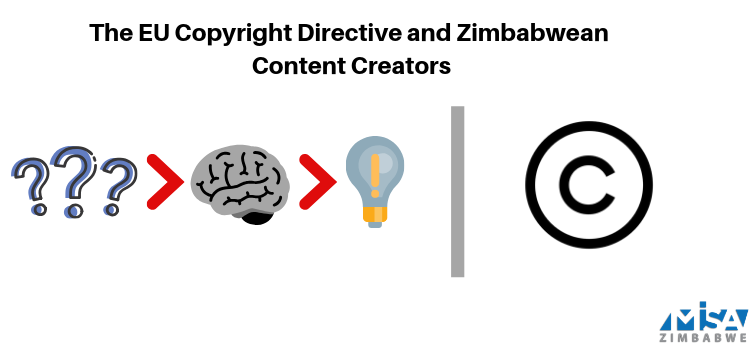On Tuesday 26 March 2019 the European Parliament voted in favour of adopting the Directive of the European Parliament and of the Council on Copyright in the Digital Single Market.
The EU Copyright Directive seeks to govern the way copyrighted material or media is uploaded and shared on the Internet. This makes it a cause of concern for service providers in the tech industry, content creators and Internet users on a global scale.
More so when one considers the Internet’s universal nature and the fact that EU’s digital laws also affect Internet users from other parts of the world including Zimbabwe.
For example, the General Data Protection Regulation (GDPR), was drafted and implemented to protect the privacy rights of European residents, but its effects have extended well beyond the EU’s geographical borders.
The EU Copyright Directive will have two major effects on the sharing of media and information on the Internet.
Firstly, Article 17 of the Directive states that service providers such as YouTube, Facebook, Google and Instagram, will now be responsible for any copyrighted media or information that is shared on their platforms.
Secondly, Article 15 of the EU Copyright Directive will impose a “link tax” to search engine service providers such as Google and news aggregator service providers. A local example of a news aggregator service is the Zimbabwe Situation.
Any online service providers that share or aggregate news sources will have to negotiate a fee with the publishers and authors of the news articles or stories shared. At the moment, the sharing of just news “snippets” and links to news articles are exempt from paying this “link tax.”
Article 17’s successful implementation will rely on the use of service agreements entered into between online service providers such as Facebook and the copyright holders or license holders of copyrighted work. In terms of such an agreement, Facebook, for example, will have to police its platforms to ensure that there is no media or information shared in a manner that violates any copyright.
In the past, this responsibility to police the Internet for copyright violations lay with the owner of the copyright and any other entities wishing to enforce specific copyrighted works. Any copyright holder that wanted to prevent the unauthorised sharing of its works could make a request to have the offending material taken down.
But the EU Copyright Directive means that online service providers have to proactively watch for copyright breaching posts. Any service provider that fails to police its platforms will be held liable for sharing the content.
This is a beneficial arrangement for music record labels, movie studios and other media entities that own and make money from copyrighted works. In theory, this means that Zimbabwean copyright holders will be able to enter into agreements with online service providers for the purpose of preventing the unauthorised sharing of their content in the EU.
Susan Wojcicki, YouTube chief executive officer, is quoted as saying that this Directive “… could put the creative economy of creators and artists around the world at risk.” This is because there will be less room for content creators to use copyrighted material in their work.
Content creators including those in Zimbabwe who share their works online will have to take extra care not to use any copyrighted work in their productions. Any content based on copyrighted work, for example, the performance of music covers, and the review of films will be closely scrutinised by an online service platform before being shared on that platform.
The implementation of the EU Copyright Directive means online service providers will have to invest in the development of content filter software to prevent the uploading of copyrighted materials that may be shared without the copyright holder’s permission.
These content filters will not be used within the EU territories but worldwide. This raises further concerns that the use of content upload filters will promote censorship and restrict the right to free expression.
The EU Directive still has more processes to go through before it is fully implemented in the EU. It still has to be ratified by the EU Council. After that, EU member states will elect to transpose the new laws into their respective national laws. States that wish to do this will have up to 2021 to do so.
Other EU countries such as Germany and Poland have already indicated that they will fight the full adoption of this Directive.
//Ends









